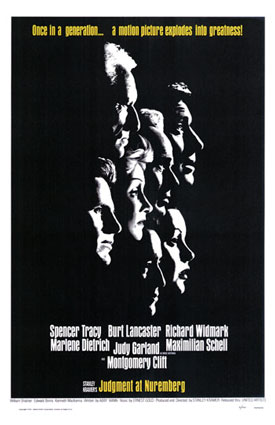 Apologies, gentle Judy fans. While I intended to bring you the usual dose of morning Garland sunshine, I failed in meeting either the requirement for sunshine or the morning deadline. In this case, however, that’s probably for the best. Considering the subject of this film, it is probably better that you have a cup of coffee and a bite to eat before you sit down to watch it. This week, I’m breaking with tradition slightly. While Judy Garland does not sing any numbers in Judgment at Nuremberg, this is a performance and a movie that must be seen.
Apologies, gentle Judy fans. While I intended to bring you the usual dose of morning Garland sunshine, I failed in meeting either the requirement for sunshine or the morning deadline. In this case, however, that’s probably for the best. Considering the subject of this film, it is probably better that you have a cup of coffee and a bite to eat before you sit down to watch it. This week, I’m breaking with tradition slightly. While Judy Garland does not sing any numbers in Judgment at Nuremberg, this is a performance and a movie that must be seen.
The Movie: Judgment at Nuremberg (UA, 1961)
The Writer: Abby Mann (screenplay)
The Cast: Maximilian Schell, Burt Lancaster, Spencer Tracy, Marlene Dietrich, Richard Widmark, Judy Garland, directed by Stanley Kramer
The Story: When Stanley Kramer decided to adapt Abby Mann’s dramatization of the Nuremberg trials, Judy Garland was not his first choice for Irene Hoffman, the woman accused of miscegenation under Nazi law. However, after seeing Garland in concert, Kramer was impressed by her emotional range, and agreed to take a risk on the star who hadn’t made a film in over half a decade.
The risk paid off. Judy Garland’s performance, though only 18 minutes long, remains one of the most devastating of the film. While Irene is only one example of the many ways unjust laws persecuted and destroyed lives in Nazi Germany, Judy’s short performance elevates Irene from symbol to human being. Framed in closeup, Judy plays Irene’s grief in many keys: dignified mourning, frustrated confusion, disdain, defensiveness, fear, until it builds to a crescendo of anger and and injustice that almost renders her speechless.
This would be Judy’s only foray into “legitimate” drama (as opposed to the musicals and melodramas of her past), and it stands as a testament to her what might have been. Judy would receive her second and final Academy Award nomination for this performance (losing this time to Rita Moreno in West Side Story). But while Judy’s career in films was waning, her star was about to rise on a new medium: television.
Select Previous Highlights:
“Zing Went the Strings of My Heart” (1938), "Over the Rainbow" (1939), "For Me and My Gal" (1942), "The Trolley Song" (1944), "On the Atchison Topeka and the Santa Fe" (1946), "I Don't Care" (1949), "Get Happy" (1950), "The Man That Got Away" (1954)